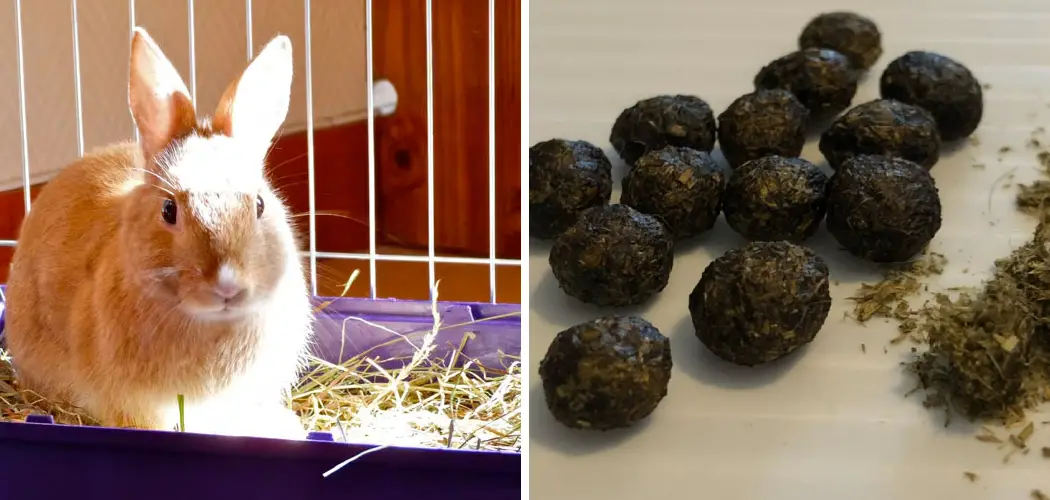Rabbits are cute and cuddly pets that make great companions. However, one common problem faced by rabbit owners is the issue of their rabbits pooping everywhere. Rabbit poop can be a nuisance and it’s important to address this issue for the health and hygiene of both your pet and your home.
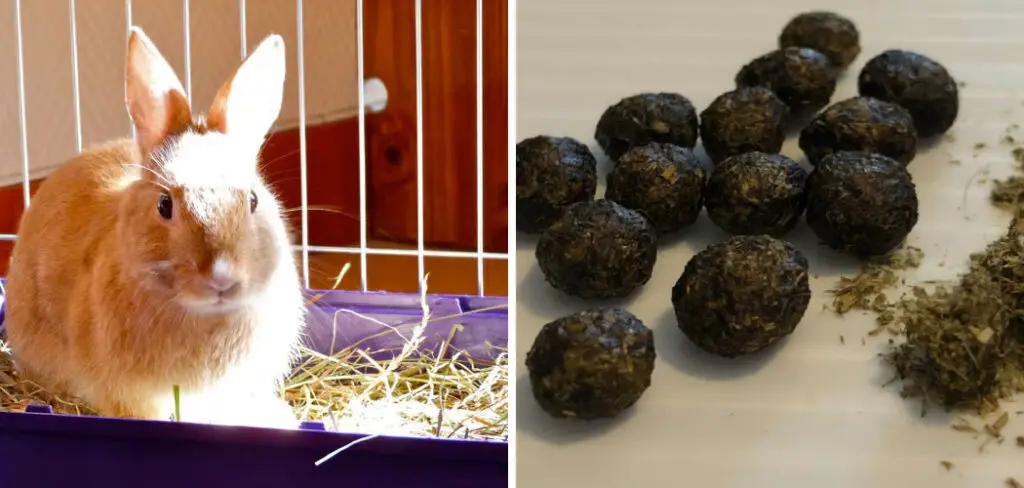
In this guide, we will discuss some tips and tricks on how to stop rabbit pooping everywhere.
Necessary Items
Before we dive into the methods, here are some necessary items that you will need to have on hand:
- Litter Box: A litter box is an essential item for any rabbit owner. It’s important to choose a litter box that is big enough for your rabbit and has high sides to prevent them from kicking out the litter.
- Hay: Rabbits need hay in their diet for digestive health. It’s also a great material for lining the litter box.
- Pellets: Choose high-quality pellets specifically made for rabbits.
- Newspaper or Puppy Pads: These can be used as an additional layer under the litter box to catch any stray droppings.
Understanding Rabbit Behavior
Before we delve into ways to prevent rabbit poop, it’s important to understand why rabbits do it in the first place. Rabbits are naturally prey animals and they have a strong instinct to mark their territory with their feces. This behavior is accentuated when they are in a new environment or feel threatened.
12 Steps on How to Stop Rabbit Pooping Everywhere
Step 1: Spay or Neuter Your Rabbit
One of the most effective ways to control rabbit poop is by spaying or neutering your rabbit. This can decrease their territorial behavior and reduce the amount of dropping that they produce. It’s also beneficial for their overall health.
Step 2: Create a Safe Environment
Rabbits can get anxious if they feel unsafe in their environment. Make sure to provide them with a safe and comfortable living space where they can relax without feeling threatened. Also, be mindful of any loud noises or sudden movements that may startle your rabbit and cause them to release droppings.
Step 3: Litter Box Training
Train your rabbit to use a litter box. Start by placing the litter box in an area where your rabbit frequently poops. You can then gradually move it to a more convenient location once they are used to using the litter box.
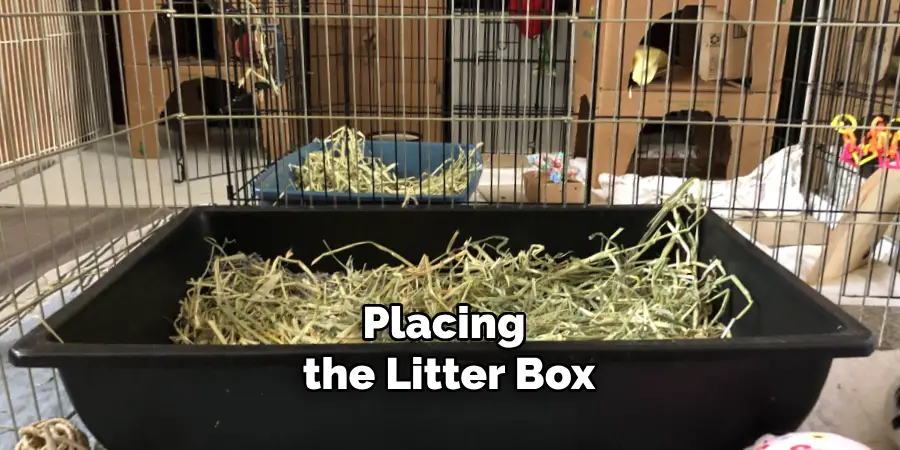
Step 4: Use the Right Type of Litter
Rabbits have sensitive respiratory systems, so it’s important to choose a dust-free and non-toxic litter. Avoid using clay or clumping litter, as they can be harmful if ingested. Some suitable options include paper-based litter, wood pellets, or even newspaper.
Step 5: Provide Enough Hay
Hay is an essential part of a rabbit’s diet and it also helps with their digestion. Make sure to provide your rabbit with unlimited hay to encourage them to eat more fiber and produce firmer droppings. If your rabbit is not eating enough hay, try offering different types of hay or even fresh herbs to entice them.
Step 6: Don’t Overfeed Pellets
Pellets should only make up a small portion of your rabbit’s diet. Overfeeding pellets can lead to soft and smelly droppings. Follow the recommended guidelines for pellet portions based on your rabbit’s weight. As a general rule, pellets should only make up 5-10% of their daily food intake.
Step 7: Clean the Litter Box Regularly
Just like cats, rabbits prefer a clean litter box. Make sure to scoop out any droppings or wet spots daily and completely change the litter at least once a week. This will not only keep your rabbit happy but also prevent any potential health issues caused by a dirty litter box.
Step 8: Add Some Toys
Bored rabbits are more likely to engage in destructive behavior, including pooping outside their litter box. Provide your rabbit with toys and chew items to keep them entertained and reduce stress levels. Other forms of enrichment, such as tunnels and playpens, can also keep your rabbit mentally stimulated.
Step 9: Supervise Time Outside the Cage

If you let your rabbit roam freely in your home, make sure to supervise them closely. This will not only prevent any accidents but also allow you to redirect them to their litter box if needed. Start by giving them short periods of free time and gradually increase it as they become more litter-trained.
Step 10: Address Any Medical Issues
If your rabbit suddenly starts pooping outside their litter box, it could be an indication of a medical issue. Check with your veterinarian to rule out any underlying health problems, such as digestive issues or bladder infections.
Step 11: Use Positive Reinforcement
Rabbits respond well to positive reinforcement. Whenever your rabbit uses their litter box, praise them and offer a treat. This will encourage them to repeat the behavior in the future. Keep treats handy near the litter box for easy access.
Step 12: Be Patient and Consistent
Litter training a rabbit requires patience and consistency. It may take some time for your rabbit to understand where they are supposed to go, so be patient with them and continue with the training methods consistently. With time and effort, your rabbit will learn to use their litter box and stop pooping everywhere.
Rabbit pooping can be a frustrating issue, but with the right approach and patience, you can effectively train your rabbit to use their litter box. Remember to provide them with a safe and comfortable environment, the right type of litter, unlimited hay, and proper supervision.
And don’t forget to show them love and positive reinforcement along the way. With these steps on how to stop rabbit pooping everywhere, your rabbit will be a litter box expert in no time! So, don’t get discouraged, and keep working with your furry friend to maintain a clean and happy living space for both of you.
9 Safety Measures for Cleaning Rabbit Poop
Cleaning up rabbit poop can be a messy task, but it’s important to do it safely to avoid any potential health hazards. Here are 9 safety measures you should follow when cleaning rabbit poop:
1) Wear Disposable Gloves
Rabbit droppings may contain bacteria or parasites, so it’s important to wear disposable gloves when cleaning them up. This will prevent any potential contamination and keep your hands clean. Be sure to dispose of the gloves properly after use.

2) Use a Dust Mask
Rabbit droppings can produce dust, which can irritate your respiratory system. It’s recommended to wear a dust mask or face covering when cleaning up rabbit poop to prevent inhaling any particles. Also, make sure to clean or replace your mask regularly.
3) Avoid Touching the Face and Mouth
To reduce the risk of potential contamination, avoid touching your face or mouth while cleaning up rabbit poop. If you accidentally touch your face, wash your hands thoroughly with soap and water before continuing.
4) Clean Up Indoors if Possible
If possible, clean up rabbit poop indoors to avoid exposure to any outdoor elements such as rain or wind. This will also make it easier to dispose of the waste properly. Even if you are cleaning up indoors, make sure to open windows for proper ventilation.
5) Use a Disposable Dustpan and Broom
To avoid cross-contamination, it’s best to use disposable tools such as a dustpan and broom when cleaning up rabbit poop. Make sure to dispose of them after use or clean them thoroughly with disinfectant. Avoid using household items that will be used for other purposes.
6) Use a Disinfectant Cleaner
After removing all visible droppings, use a disinfectant cleaner to clean the affected area. This will help kill any remaining bacteria or parasites and prevent the spread of disease. Be sure to follow the instructions on the cleaner and wear gloves while using it.
7) Dispose of Waste Properly
Rabbit droppings should be disposed of in a sealed bag and thrown away in an outdoor trash receptacle. Do not flush the droppings down the toilet, as it can cause plumbing issues. If you have a garden, you can also use the droppings as fertilizer after composting them for at least a month.
8) Wash Your Hands Thoroughly
After completing the cleanup, wash your hands thoroughly with soap and water for at least 20 seconds. This will help remove any potential bacteria or parasites that may have come in contact with your skin.
9) Consult a Professional Cleaner
If you are unable to clean up rabbit poop safely or if there is a large amount of waste, it’s best to consult a professional cleaner. They will have the proper equipment and knowledge to handle the situation safely and effectively.
Following these safety measures will help ensure both you and your rabbit stay healthy while cleaning up their droppings. By being cautious and taking proper precautions, you can maintain a clean living environment for you and your furry friend.
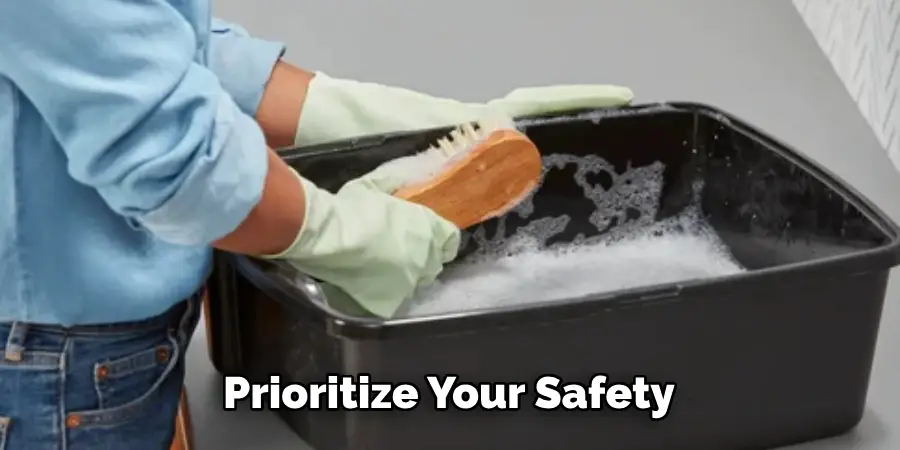
So, don’t forget to prioritize your safety while caring for your rabbit’s litter box! Keep these tips in mind, and happy cleaning! Remember that with proper training and maintenance, you can keep your rabbit’s poop in their litter box where it belongs.
8 Things to Avoid When Litter Training Your Rabbit
Litter training a rabbit may seem like a daunting task, but with patience and consistency, it can be achieved. However, there are certain things you should avoid when litter training your rabbit to ensure their success and well-being. Here are 8 things to avoid:
1) Punishing Your Rabbit
Rabbits do not respond well to punishment, and it can harm your relationship with them. If your rabbit has an accident outside of their litter box, do not scold or punish them. Instead, calmly clean up the mess and continue with the training process.
2) Using Clumping Litter
Avoid using clumping litter when litter training your rabbit, as they may ingest it while grooming themselves, which can cause digestive issues. Opt for a safe and absorbent litter made specifically for rabbits. Softer options such as paper, wood pellets, or hay-based litter are also good alternatives.
3) Changing Litter Box Location Frequently
Rabbits are creatures of habit and thrive on routine. Avoid changing the location of their litter box frequently, as it can confuse them and make it harder for them to learn where to go. Find a suitable spot and keep the litter box there consistently.
4) Using Harsh Cleaning Products

Avoid using harsh cleaning products when cleaning your rabbit’s litter box. Strong scents or chemicals can be harmful to rabbits and may discourage them from using their litter box. Stick to mild, bunny-safe cleaners, or simply use hot water and vinegar.
5) Neglecting Supervision
It’s important to supervise your rabbit while litter training to catch any accidents and redirect them to their litter box. If you leave them unsupervised, they may develop bad habits or use the wrong area as a bathroom.
6) Not Providing Enough Litter Boxes
Rabbits are territorial animals and like having multiple bathrooms in their living space. It’s recommended to have at least one litter box per rabbit, plus an extra one for every additional room in which they have access.
7) Overfilling the Litter Box
Make sure to only fill the litter box with a thin layer of litter. If it’s too deep, your rabbit may have trouble digging and covering their waste. Plus, it’ll be easier to clean up any messes or spills.
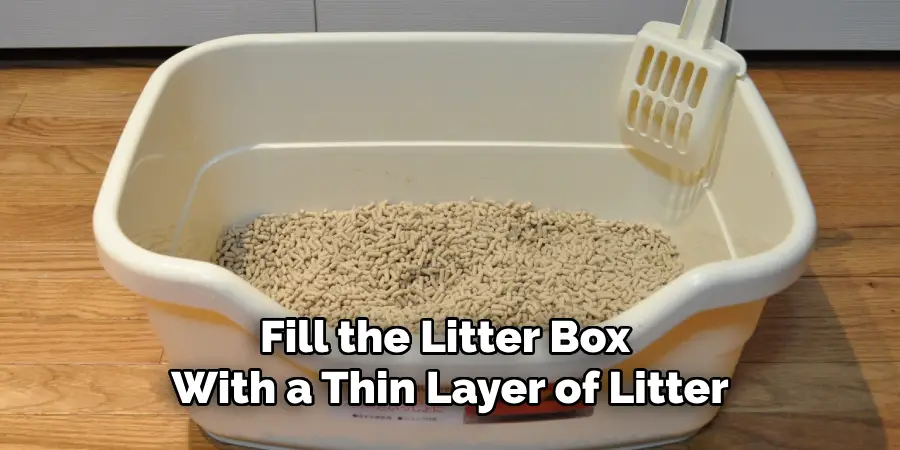
8) Giving Up Too Soon
Litter training takes time and patience, so don’t get discouraged if your rabbit has accidents. Keep up with the training and praise them when they use their litter box correctly. With consistency and positive reinforcement, your rabbit will eventually learn to use their litter box consistently.
By avoiding these common mistakes on how to stop rabbit pooping everywhere, you can ensure a successful and stress-free litter training experience for both you and your rabbit. Remember to be patient and consistent, and use positive reinforcement to encourage good litter box habits. With proper training and care, your rabbit will become a pro at using their litter box in no time!
8 Additional Tips for a Clean and Healthy Rabbit Environment
While litter training and properly cleaning up after your rabbit’s droppings are essential for maintaining a clean living environment, there are other steps you can take to ensure your rabbit stays healthy and happy. Here are 8 additional tips:
1) Provide Plenty of Hay
Hay is an essential part of a rabbit’s diet and plays a crucial role in their digestive health. Make sure to provide them with fresh, high-quality hay every day and replace it when it becomes soiled. As rabbits spend a lot of time in their litter box, having hay nearby can also encourage them to use it as a toilet.
2) Keep Their Living Space Well-Ventilated
Rabbits are sensitive to heat and humidity, so it’s important to keep their living space well-ventilated. This will help prevent the buildup of ammonia in their urine, which can be harmful to their respiratory system.
3) Groom Your Rabbit Regularly
Regular grooming is essential for keeping your rabbit’s coat clean and free of mats. It also helps prevent hairballs, which can cause digestive issues. Plus, it’s a great bonding activity for you and your furry friend.
4) Trim Their Nails
Rabbit nails can grow long and sharp, which can be uncomfortable for them and cause damage to your furniture or carpet. Make sure to trim their nails regularly (about once a month) to keep them at a safe length. Some rabbits may not enjoy nail trims, so it’s best to consult a veterinarian or professional groomer for assistance.
5) Clean Their Water Bottle/Bowl Daily
Rabbits need access to fresh, clean water at all times. Make sure to clean their water bottle or bowl daily and replace it with fresh water. This will help prevent the buildup of bacteria and algae.
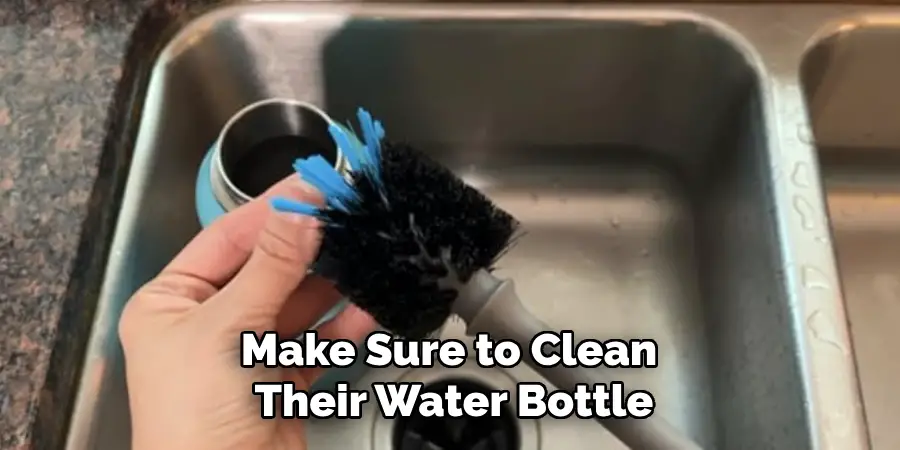
6) Provide Enrichment and Exercise
Rabbits are active animals and need plenty of exercise to stay healthy. Providing them with toys, tunnels, and other forms of enrichment can help keep them mentally stimulated and prevent destructive behaviors. Make sure to also give them time outside of their cage to hop around and explore in a safe, supervised area.
7) Keep an Eye Out for Health Issues
Regularly check your rabbit’s eyes, ears, teeth, and overall body condition for any signs of health issues. If you notice anything concerning, consult a veterinarian as soon as possible. While rabbits are generally healthy animals, they can be prone to certain illnesses and diseases.
8) Regularly Clean and Disinfect Their Living Space
Aside from cleaning their litter box daily, it’s important to regularly clean and disinfect their living space. This will help prevent the buildup of bacteria and parasites that could potentially harm your rabbit’s health. Use a mild, bunny-safe cleaner, and make sure to dry the area afterward thoroughly.
Frequently Asked Questions
How Often Should I Change My Rabbit’s Litter Box?
It’s recommended that the litter box be cleaned daily and completely replaced once a week. This will help prevent unpleasant odors and keep your rabbit’s living space clean.
Can I Use Cat Litter for My Rabbit’s Litter Box?
No, cat litter is not safe for rabbits. Its dust content can be harmful if ingested and may cause respiratory issues. Instead, use a litter specifically made for rabbits or opt for paper-based litter.
What Do I Do If My Rabbit Keeps Having Accidents?
Continue with the litter training and clean up any accidents immediately. You may also want to consult a veterinarian to rule out any potential underlying health issues that could be causing your rabbit to have frequent accidents.
Can I Train an Older Rabbit?
Yes, rabbits can be trained at any age. However, it may take longer for older rabbits to learn new habits compared to younger rabbits. Be patient and consistent with the training, and they will eventually catch on.
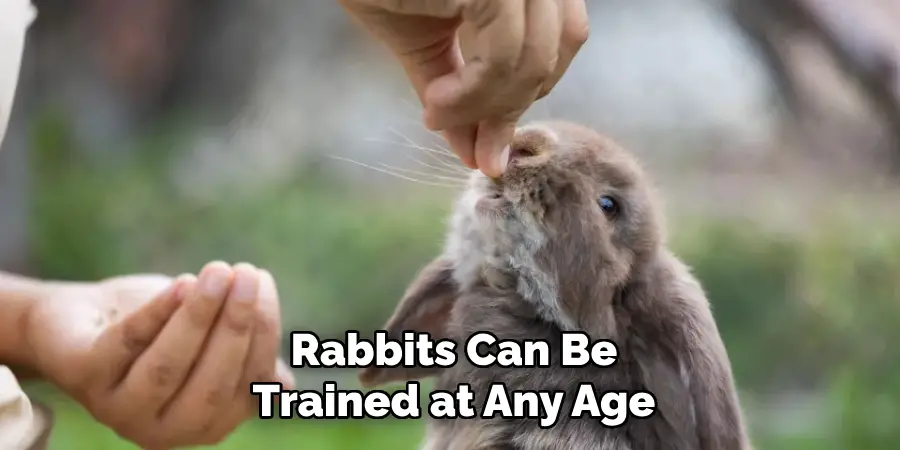
Do All Rabbits Need Litter Training?
Not all rabbits need litter training, as some may naturally use a designated area as their toilet. However, it’s still important to provide them with a clean litter box in case they do have accidents outside of their designated area. So, it is recommended to litter train your rabbit even if they seem to have good bathroom habits.
Conclusion
Litter training is essential to caring for a pet rabbit and maintaining a clean living environment. By providing proper training, consistent care, and following these additional tips on how to stop rabbit pooping everywhere, you can ensure your rabbit stays healthy and happy in their home. Remember to always be patient, use positive reinforcement, and seek professional help if needed.
With love and proper care, your rabbit will thrive in their clean and litter-trained living space.
About
Outdoor Fixes is a distinguished figure in the world of Diy design, with a decade of expertise creating innovative and sustainable Diy solutions.
His professional focus lies in merging traditional craftsmanship with modern manufacturing techniques,
fostering designs that are both practical and environmentally conscious. As the author of diy,
outdoorfixes delves into the art and science of outdoorfixes-making, inspiring artisans and industry professionals alike.
Education RMIT University
(Melbourne, Australia) Associate Degree in Design (Outdoor Fixes) Focus on sustainable design, industry-driven projects,
and practical craftsmanship. Gained hands-on experience with traditional and digital manufacturing tools, such as CAD and CNC software.
Nottingham Trent University
(United Kingdom) Bachelor’s in outdoorfixes.com and Product Design (Honors) Specialized in product design with a focus on blending creativity with production
techniques. Participated in industry projects, working with companies like John Lewis and Vitsoe to gain real-world insights.
Publications and Impact
In diy, Outdoor Fixes his insights on indoor design processes, materials, and strategies for efficient production.
His writing bridges the gap between artisan knowledge and modern industry needs, making it a must-read for both budding designers and seasoned professionals.

